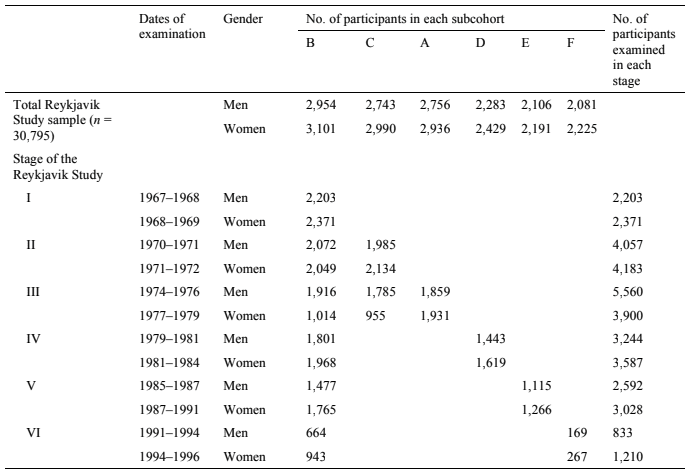The Reykjavík Study.
The Reykjavik Study was established by The Icelandic Heart Association in 1967 as a long-term population-based study. It is a prospective cardiovascular survey(study) in a large cohort.
The Reykjavik Study originally comprised a random sample of 30,795 men and women born in 1907–1935 and living in Reykjavik in December 1966. The cohort was divided into six groups (B, C, A, D, E, and F) by birth year and birth date within month,
and examined in six stages from 1967-1996 (Table 1)
TABLE 1. Cohort recruitment and examination schedule for participants in the Reykjavik Study (1967–1996)

The B group was designated for longitudinal follow-up and was examined in all stages. The F group was designated as a control group and was not included in examinations until 1991.
Men and women were examined in separate years for more efficient clinic operation. Since a standard examination was performed in each stage, longitudinal and cross-sectional data could be used to study secular and individual changes over the 30-year follow-up period.
The core study component included:
- examination by a physician
- health questionnaire
- standardized 12-lead electrocardiogram recorded and evaluated according to the Minnesota Code
- standard x-ray of the chest
- blood pressure
- fasting blood test (measures included total cholesterol, HDL, LDL, triglycerides,, glucose,)
- fasting urine test (including measurements of renal function; creatinine, microalbuminuria)
- spirometry
- height and weight
The stage VI examination (1991–1996) focused on persons aged 70 years or older from the F and B groups. It included the core examination components, plus measures of cognitive and physical function, social support, and other topics particularly relevant to aging. Surveillance for vital events and cardiovascular disease events has been continual in the cohort since 1967.
References to key research papers from the Reykjavik Study are summarized below.
- Sigurdsson E, Thorgeirsson G, Sigvaldason H, et al. Unrecognized myocardial infarction: epidemiology, clinical characteristics, and the prognostic role of angina pectoris. The Reykjavik Study. Ann Intern Med 1995;122:96–102.
- Jónsdóttir LS, Sigfusson N, Sigvaldason H, et al. Incidence and prevalence of recognized and unrecognized myocardial infarction in women. The Reykjavik Study. Eur Heart J 1998;19:1011–18.
- Andresdottir MB, Sigurdsson G, Sigvaldason H, et al. Fifteen percent of myocardial infarctions and coronary revascularizations explained by family history unrelated to conventional risk factors. The Reykjavik Cohort Study. Eur Heart J 2002; 23:1655–63.
- Andresdottir MB, Sigfusson N, Sigvaldason H, et al. Erythrocyte sedimentation rate, an independent predictor of coronary heart disease in men and women: The Reykjavik Study. Am J Epidemiol 2003;158:844–51.
- Danesh J, Wheeler JG, Hirschfield GM, et al. C-reactive protein and other circulating markers of inflammation in the prediction of coronary heart disease. N Engl J Med 2004;350:1387–97. 6. Saevarsdottir S, Oskarsson OO, Aspelund T, et al. Mannan binding lectin as an adjunct to risk assessment for myocardial infarction in individuals with enhanced risk. J Exp Med 2005;201:117–25.
- Tulinius H, Sigfússon N, Sigvaldason H, et al. Risk factors for malignant diseases: a cohort study on a population of 22,946 Icelanders. Cancer Epidemiol Biomarkers Prev 1997;6:863–73. 8. Jonsson S, Thorsteinsdottir U, Gudbjartsson DF, et al. Familial risk of lung carcinoma in the Icelandic population. JAMA 2004;292:3026–9.
- Vilbergsson S, Sigurdsson G, Sigvaldason H, et al. Prevalence and incidence of NIDDM in Iceland: evidence for stable incidence among males and females 1967–1991—the Reykjavik Study. Diabet Med 1997;14:491–8.
- Gunnarsdottir I, Birgisdottir BE, Thorsdottir I, et al. Size at birth and coronary artery disease in a population with high birth weight. Am J Clin Nutr 2002;76:1290–4.

Opening hours
- Mon - Fri: 08:00-16:00
- Saturday and Sunday: Cloesd


